Inside: If you’re wondering about unschooling pros and cons, here’s my brutally honest take (yes, there are potential cons) as an unschooling parent who has read and considered both the positive and the negative unschooling stories.
Today I went to explore a corner of the internet dedicated to formerly unschooled kids now against unschooling.
And it hit me like a ton of bricks, honestly.
The pain was intense. It physically jumps off the screen and burrows down deep, right into your soul.
I’ve felt pretty at peace with my choice to unschool these days, especially as our public school system erodes and nearly every teacher I see on Tiktok screams, “It’s on FIRE!”
Well, those stories pumped a fresh shot of anxiety through my system.
But then I took a slow, deep breath and chose to listen, instead of panic. I decided to learn from those stories, instead of naively pretending that could never be my kid.
What can I do better as an unschooling parent? What ditches do I NOT want to fall into?
So while yes, I’m still over here unschooling, I’m offering a more brutally honest take on unschooling pros and cons – for those of us currently unschooling, and those considering it.
The pros still outweigh the cons for me, especially when you consider more global “why homeschool” reasons like, I don’t know, not having to buy my child a bulletproof backpack?
But I am more aware than ever before of the potential cons, in a healthy “keep you humble and sober” kind of way.
You Might Also Like: What Does Unschooling Mean? Defining a Misunderstood Homeschool Style
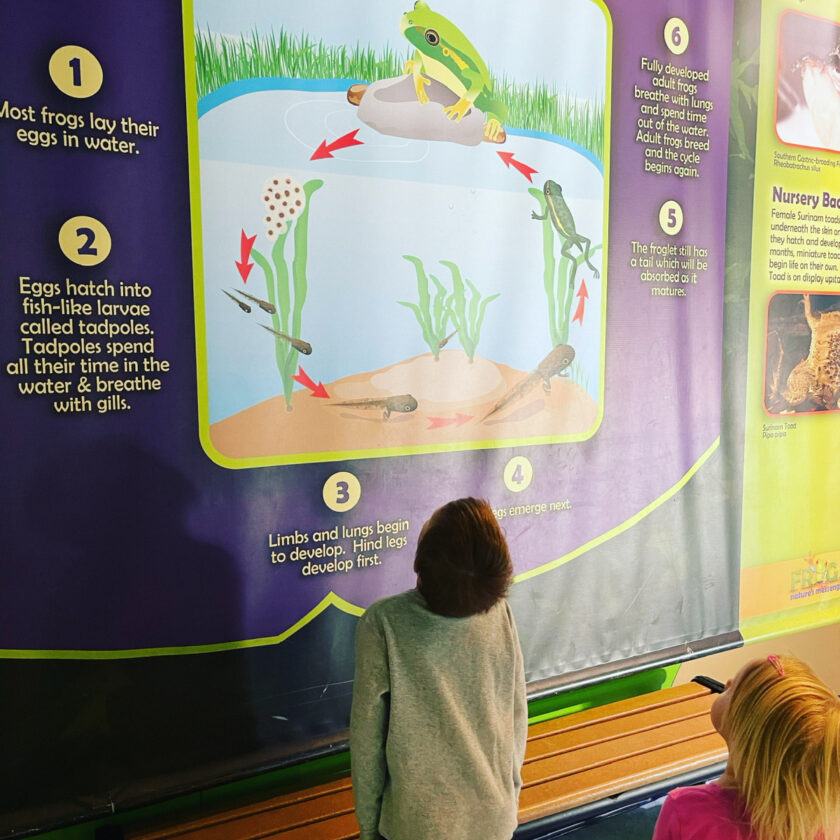
The Pros of Unschooling
This post probably contains affiliate links, which means I may earn a commission if you make a purchase through those links. As an Amazon Associate, I earn from qualifying purchases. You can find our full disclosure HERE.
I’ve written other posts about the more general benefits of homeschooling your kids. These are the pros of unschooling, a style of homeschooling, specifically.
These are the things that keep me unschooling day after day, year after year.
You Might Also Like: A Former Teacher’s Unschooling Reflections After 11 Years (No Regrets)
1. Customized Education
The possibilities for a customized education are endless.
Do you love math? Great! Want to work all the way through elementary math in a few weeks? You can!
Or maybe you love art? So many young people are told that art will never get them anywhere, or they will never make a living through their art, so they better get themselves a college degree (with loans, of course) in some practical field like accounting.
With unschooling, you have unlimited time to pursue art. If you want to draw six hours a day, go for it.
There are no time limits, no restrictions, no bells ringing telling you it’s time to interrupt that short story you were really in the flow writing because sorry, it’s time to move onto history class.
You can build a customized education for your unique future, and it’s really hard to argue with the merits of that.
Related: Unschooling Plans & Resources for 2022-2023: 7th, 5th, 3rd, and K
2. Freedom & Autonomy
This point is twofold: freedom and autonomy, slightly different things. Let me explain.
Deciding how you spend your time is the pinnacle of freedom these days. It’s what adults work so hard all their lives for, right? Retirement = time freedom, FINALLY.
Freedom to me is not being beholden to a school’s schedule or curriculum.
Get five potentially sleep-deprived kids out the door at 7:30 a.m.? Yeah, no thanks. Force them to learn things they don’t want to learn? Again, nope.
Autonomy means my kids have freedom over their time and their minds, not just their bodies.
I feel like consent is a pretty common concept these days when it comes to bodies, but that consent stops when it comes to their minds. Because every day, adults across the world ignore consent where the mind is concerned, defending it with “it’s for their own good”.
Adults force children to learn things they don’t want to learn, things they either don’t need or if they do need it, would have learned happily on their own when they needed it (the ideal time to learn something).
Schools also take away children’s time autonomy…in order to then take away their mind autonomy.
I’ve gone over it again and again and again, but I still can’t find a way to justify that. But I get that many parents don’t have a choice but to send their kids to school.
3. Mental Health
It’s amazing to me how little people and systems value mental health these days.
We honestly believe that forcing our children to do things they don’t want to do five days a week, 7.5 hours a day is good for them, a lesson they need to learn.
You probably already know that we have a childhood mental health crisis going on in America: teen depression and anxiety rates are skyrocketing, with waiting lists for therapists back-logged six months or more.
In some cases, as with the pandemic, disruption of teen social lives at such a pivotal time in their development definitely contributed to the increase. Missing school was contributing to their unhappiness.
But even before the pandemic, we were seeing upward trends.
Still, society rarely considers the stresses of school to be the source of the problem.
When you lack autonomy in your life as an adult, when you feel trapped in a job or system, you see similar tendencies: anxiety, depression, anger and frustration.
Why should the same not be true for children?
When you have very little control over your life, very few choices or freedoms, mental health suffers. Period.
If you are trapped in a bullying situation you can’t get out of, your mental health suffers.
If you can’t get the grades your parents want you to get no matter how hard you try, your mental health suffers.
When you are forced to conform your sleep schedule to insane times like 7:30 a.m. start times (for HIGH SCHOOL, when kids need MORE sleep and are biologically wired to stay up LATER), and you don’t get enough sleep, say it with me now:
Your mental health suffers.
Because unschooled children have an incredible amount of autonomy, and the time to pursue things that bring them joy, their mental health has the potential to be far better than the national averages.
Related: How to Create an Unschooling Schedule (No, It’s Not Taboo)
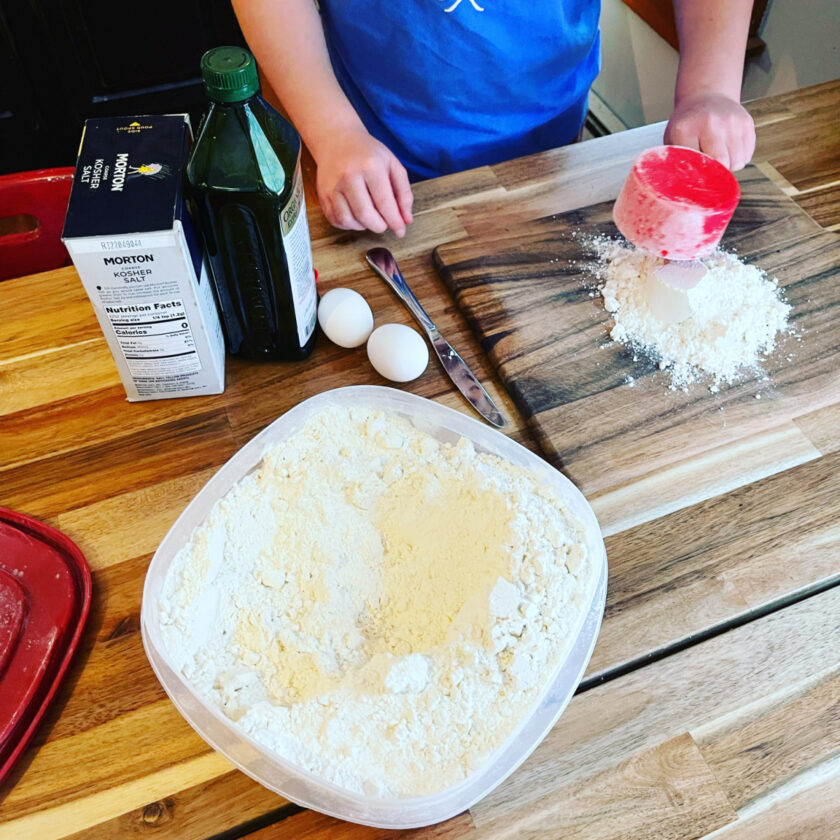
4. Real World Skills
Unschooling leaves you with a lot of time to learn practical life skills, such as…
- Laundry
- Cooking
- Cleaning
- Shopping
- Budgeting
- Investing
- Taxes
- Business
- DIY Skills
Can you learn these skills if you are in school? Absolutely! There are many dedicated parents who pass these skills on to their kids right alongside school.
But is your time to do so more limited when you spend the majority of your waking hours in school, not to mention completing homework later? Yes.
Do kids deserve free time to pursue their own interests outside of school? Yes. Do they need time for rest and recreation? Yes, again.
And finally, if you spend more time in school than in the real world, can you really be learning how to function in it? Questionable.
If you are also doing extracurriculars on nights and weekends and rushing from one thing to the next, plus school, plus homework, and maybe both parents are working full-time, too, as you often need to do to get by today, I’m honestly not sure when there is time to learn real life skills.
If you’re teaching your kids all of this on top of school, you rock!
5. Love of Learning
Preserving a love of learning is one of my primary reasons for pursuing unschooling.
I wanted my kids to stay curious, to never stop asking because they knew they could find the answers they wanted right then and there.
In school, you are forced to conform to a specific timetable with a specific curriculum and specific objectives. You don’t have time for off-track questions, and eventually, kids just stop asking.
With unschooling, we have time for all the rabbit trails. We can answer questions as in depth as they want to go, stopping and starting our learning as needed.
And being forced to learn things you don’t want to learn, over time, coupled with not learning what you do want to learn, has the potential to create a calloused, jaded perspective on learning. I didn’t want that for my kids.
And when kids learn things that 1) they’re actually curious and want to learn and 2) they truly need in order to achieve a goal or objective they set for themselves, they are far more likely to retain that learning.
Related: Why Homeschool? Here Are My Four Main Reasons
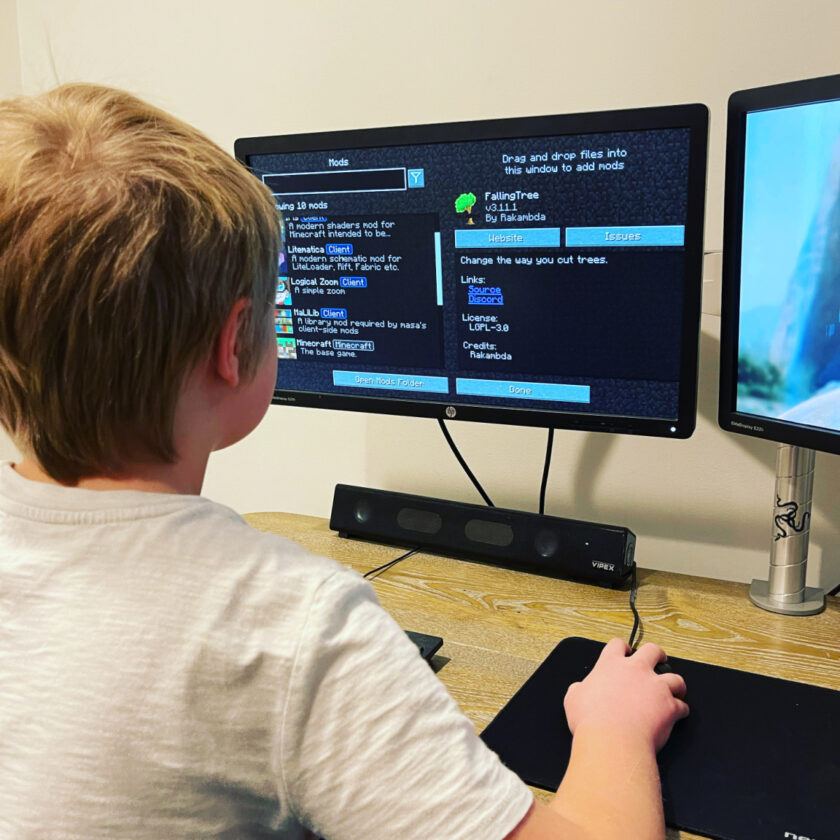
6. Not Easily Pressured
Last year, my son was on a soccer team and encountered bullying for the first time. This punk decided to call my son’s interest in Minecraft “babyish”.
The bullying experience quite frankly sucked, and I wish I’d handled it differently. It may have played a part in my son quitting soccer.
But did he quit Minecraft? No. He stuck with it.
Maybe this is just my kids, but I like to think that unschooling grounds you. You like what you like, are who you are, and it doesn’t matter what other people think.
I’m sure my kids will continue to encounter toxic people who attack them for their appearance, or their interests or their opinions.
I hope that unschooling will give them the strength to know themselves, trust themselves and to stand strong in who they are, while still staying open to new perspectives and ideas.
You Might Also Like: How Unschooling Is a Form of Political Protest (for Now, It’s All I Can Do)
7. Problem-Solving Skills
My favorite thing about unschooling is watching my kids solve problems out of pure intrinsic motivation.
I don’t give them these problems: they come up with them on their own, in the middle of their own pursuits.
From working out how to read in their own unique way to figuring out how to modify their video game (without breaking the computer) to improving sketches of profile faces, they persevere and find solutions to their problems.
They dig deep into Youtube to find the answers they want. They ask for help to build skills they want or need. We search for a book that can help.
Once again, can you do this while in school? Yes.
But learning to solve problems you actually care about is always preferable, at least in my book.
You Might Also Like: Unschooling Kindergarten – 7 Ideas for an Amazing Year Without School
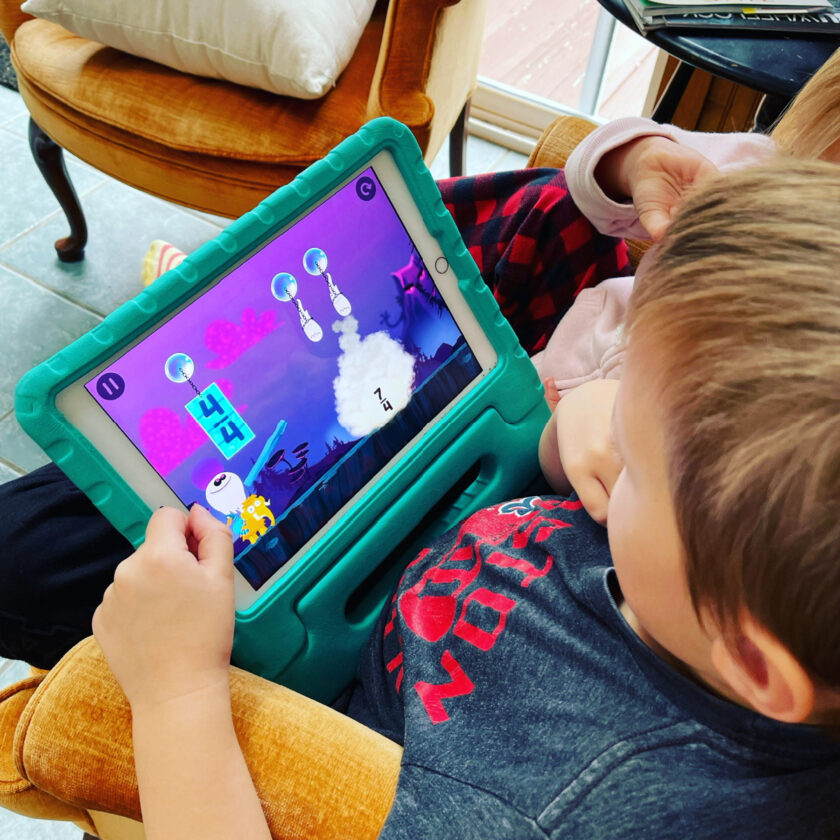
The Cons of Unschooling
Keep in mind that these are potential cons. They are not guaranteed to happen, and many of them can be overcome.
There are plenty of unschooled kids who grow up perfectly happy and become successful, thriving adults.
Read these for awareness, not to be scared away from unschooling.
And remember, just like there are unschoolers who have had negative experiences and outcomes, there are definitely more public school students who have had negative experiences and outcomes.
1. Felt Difference
The biggest complaint I’ve seen among unschoolers who had bad experiences was not feeling “normal”.
As unschooling parents, this probably isn’t a huge concern to us.
Many of us are rebels to the core, have been burned by “normal” and have adopted a, “Normal? Who wants normal?!” outlook on life.
What we might sometimes fail to consider is that our child might one day grow up and want normal, and we need to be o.k. with those feelings and choices.
Feeling out of place and abnormal when you’re young can be much more challenging than as an adult, who probably already has established relationships and can ignore society’s norms with a bit more confidence.
It has the potential to make connecting with their public schooled peers difficult (not every unschooled kid feels this way).
So what makes them feel “not normal” besides not having typical school experiences?
The biggest one probably is…
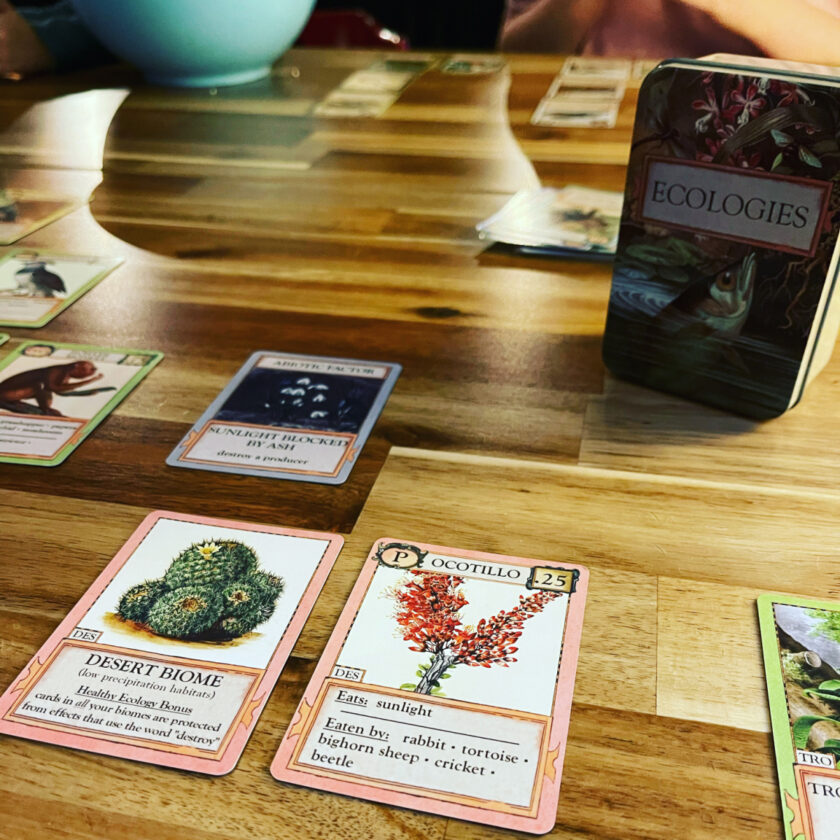
2. Knowledge Gaps
I could go on and on about knowledge gaps and how they aren’t a big deal.
If we approach life with the attitude that we are always learning, you don’t need to learn something at 12 (that most 12-year-olds learn). You could learn it at 18 or 25 or 40, right?
“You can learn it when you need or want to learn it,” is a common unschooling mantra.
But the reality is, for unschooled kids, this might one day be a con to them, practically and/or emotionally, no matter how much we tell them it isn’t a big deal.
We live in a world that unfortunately judges you by the facts you know, and the ones you don’t. There are entire Tiktok channels dedicated to asking strangers what the stars on the American flag stand for (and how many there are, while they’re at it).
When you don’t know these things, you can easily be shamed for not knowing them.
Then there’s the reality that sometimes those gaps means it takes you ten years to finish a bachelor’s degree, instead of four. That’s a pretty big deal.
Even worse potentially are gaps in cultural knowledge. These are ones they might feel particularly acutely, depending on their peer group.
So given all of that, gaps are something I don’t take as lightly anymore, even though I know that yes, everyone has them when they graduate high school: homeschooled, unschooled or traditionally schooled.
I continue to brainstorm creative ways to fill these gaps, and it’s part of why I approach screen time the way I do. Kids learn so much from screens, including cultural knowledge.
Ultimately, children don’t know what they don’t know.
Our job as unschooling parents is to offer new things and encourage them to try them. I think that after establishing a solid, trust-based relationship, you can do that without force or coercion.
Related: How to Track Learning When You Unschool – 5 Valid Options
3. Freedom
Wait, you’re saying that “freedom” can be both a pro and a con? Yes: hear me out.
I think that when many people worry that unschoolers won’t be able to function in the real world, what they really mean (beyond the socialization question) is that unschoolers won’t adapt well to what many adults accept as inevitable.
What is this inevitable thing adults accept? Spending the majority of your time doing things you don’t want to do.
The majority of adults endured twelve years of school, something they might have avoided if given the choice. So they spent twelve years doing something they didn’t want to do.
Spending the majority of your formative years doing things you didn’t want to do can condition you for a lifetime of doing things you don’t want to do.
Unschoolers often experience the opposite: they spend the majority of their time doing things they want to do.
Do they also do things they don’t want to do? Yes, but usually in service of some higher passion or interest.
So are unschoolers unprepared to accept this bleak reality? Are they ruined for “normal”?
Probably, yes.
But is that such a bad thing? What if they don’t need to be caught up in “normal” things like crippling debt and endless consumerism and soul-sucking work and toxic relationships?
What if young adults can find work they (mostly) enjoy and create a life on their own terms? Because they know what makes them tick and what they enjoy doing by the time they hit adulthood?
Whether you still think this particular point is a con is up to you.
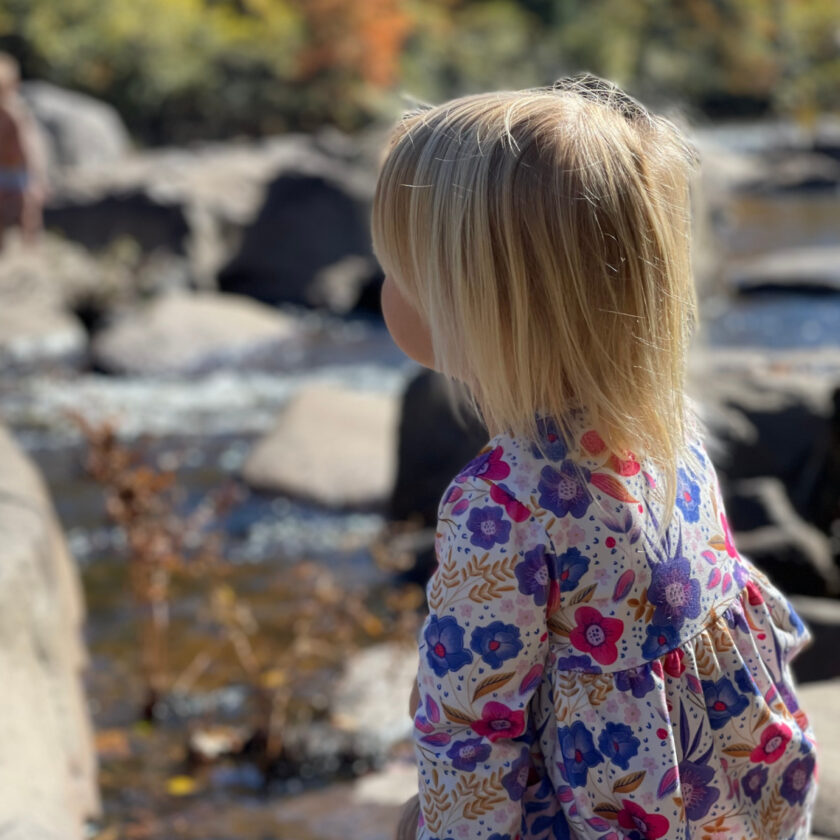
4. Not Understanding Unschooling
Sometimes, parents don’t fully understand unschooling, particularly the parent’s role. Unschooling is a partnership between parent and child, a collaboration.
Unschooling is NOT leaving your child to fend for themselves, to learn on their own all the time.
Unschooling involves a lot of “strewing” experiences for your child: taking them to parks, museums, monuments. Parents suggest ideas, courses, trying to find creative ways to get them some of that cultural (and other) knowledge you have, but they don’t.
Unschooling parents also must do the hard work of deschooling themselves, and that’s not something parents are always willing to do.
Do I think public school is a great solution? No.
It’s so bad at the time of this writing that teachers are leaving public schools to homeschool their own kids (and applauding the rest of us for doing it), which gives very “canary in a coal mine” vibes, as Sarah from Happiness is Here puts it.
But is school a better alternative to a bad unschooling experience? Probably yes.
If parents are unable (or unwilling) to, for whatever reason, offer their child opportunities for socialization and growth, such as extracurriculars, classes, or meet-ups, if they are unwilling to partner with their child in crafting an customized education, they may need to reconsider unschooling.
5. Unschooling Dogma
“Dogma is a blind obedience to the way things are done and it is alive and well in the unschooling world.”
Lucy AitkensRead, Unschooling Parent, Advocate & Author at Disco Learning
Unschooling can have dogmatic flavors to it, depending on which group you join and how you’re introduced to it.
If you’ve ever joined an unschooling Facebook group not knowing it was a radical unschooling group and casually mentioned that you ask your kids to do workbooks, you know what I’m talking about.
It’s a strict warning, or possibly comments that come off as shaming. Like you’re not a pure enough unschooler.
Any time gate-keeping is that strict, warning bells go off in my head, especially since leaving a high control religion. I absolutely understand wanting to create safe spaces for unschooling parents, but still.
There’s the subtle or overt message that you’re either a “pure” unschooler or you’re not. To some, there is no sliding scale of unschooling – you can’t dabble in it or choose to unschool some subjects, but not others.
It can be a major turn-off for some people trying to understand unschooling and potentially negatively affect children when you are unwilling to consider the unique needs of the child in front of you because of dogma.
(Lucy AitkensRead who I quoted earlier has recently shared some excellent perspectives on unschooling dogma you can read HERE.)
6. Financial Limitations
Something that stood out in the “unschooled kids against unschooling” was a lack of opportunities.
I wonder if because the primary unschooling parent was staying home full-time, perhaps their finances were rather limited.
Or the parents were, for whatever reason, unwilling to invest in their child’s interests and offer extracurriculars outside the home, even though they had the money and time to invest.
Can you unschool for free or cheap? Yes.
Will that work long-term, into middle and high school? It might, depending on your child’s interests.
If you want to offer your child opportunities to pursue an education through their interests, funding those interests needs to be part of the discussion long-term. How will you fund a pricey interest should it arise?
It’s definitely a potential con, and I understand why people might then see unschooling as only an option for the privileged.
I wish unschooling schools were more widely available and accessible – I have a few kids who would love it. But even if one was close to us, funding it would be a challenge, so we continue to do the best we can with the resources we have available to us.
Related: How Much Does Unschooling Cost? Typical Expenses & How to Save
7. Parent Anxiety
Finally, the anxiety you feel as a parent when your child isn’t following traditional education – not in school, not traditionally homeschooling, just following their interests – can be a significant con.
As someone with anxiety, the number of days I’ve felt uncomfortable and anxious, wondering if I was ruining my child’s future…well, it was a lot of days.
If anxiety is the dominant emotion for months and months, you may not be able to function well as an unschooling parent full partnering with your child, and then it’s worth considering other educational options.
Your mental health matters. ❤️
Adopting alternative views about childhood and education might not work for you, and that’s o.k. Unschooling isn’t the best fit for every family.
If you want to unschool though, I’ll tell you from one parent with anxiety (and a lot of school conditioning) to another that you CAN deschool yourself and get to the other side…but it’s a lot of hard mental/emotional work.
Listening to unschooling podcasts and reading unschooling books are my favorite ways to deschool!
You Might Also Like: Unschooling vs. Homeschooling – What’s the Difference?

So How Is an Unschooling Parent to Sleep at Night, Knowing the Potential Disadvantages of Unschooling?
You don’t find many public schooled kids raving at their parents because of a bad school experience. Most often they rage against the system, instead.
But when you choose unschooling, you, the parent, shoulder all of the responsibility, and we’d be wise to remember the weight of it.
Is your child in charge of their education? Yes, but they probably didn’t choose unschooling: you did.
Anna Brown of The Living Joyfully network recently said something like this:
“I am prepared to take full responsibility for my parenting choices, knowing that my kids could one day have a different and possibly negative perspective on my choices for their education.”
Anna Brown, The Living Joyfully Podcast
So that’s where I’ve landed.
My kids might see things differently one day. There might be ways that my choices unintentionally hurt them (any parenting decision has that potential, really).
I can only apologize when the time comes, without defending my choices, and ask what I can do to support them moving forward. I can make sure to keep the door to school open for them, should they ever want to walk through it.
As parents, all we can do is make the best choices we can with the information we have today, one month at a time, one year at a time.
Anytime parents make non-mainstream lifestyle choices, there is the potential for their child to wish they hadn’t.
So as parents, we have to walk the tightrope, with full awareness of that potentially negative outcome, but also with a deep trust that just as many unschooling children have grown into fantastically successful, unschooling-positive adults, ours can, too.
Read Next: The Top 12 Unschooling Books for Rethinking Education
What are your thoughts on unschooling pros and cons? I’d love to hear them in the comments!
Before you comment, please note: thoughtful discussion on one side or the other, respectful sharing of first-hand negative experiences, or genuine questions will be considered and engaged. Toxic comments will be automatically deleted.
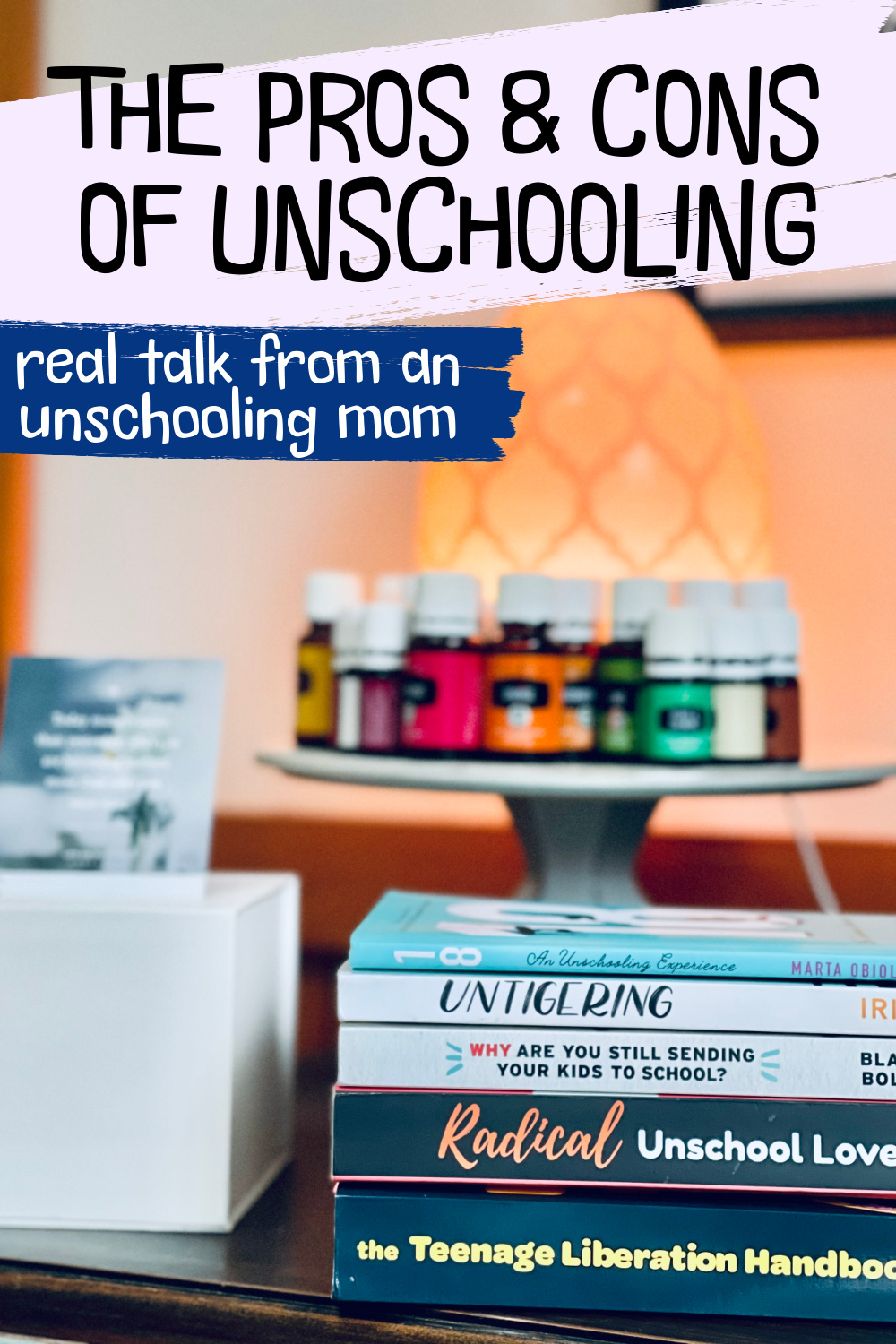

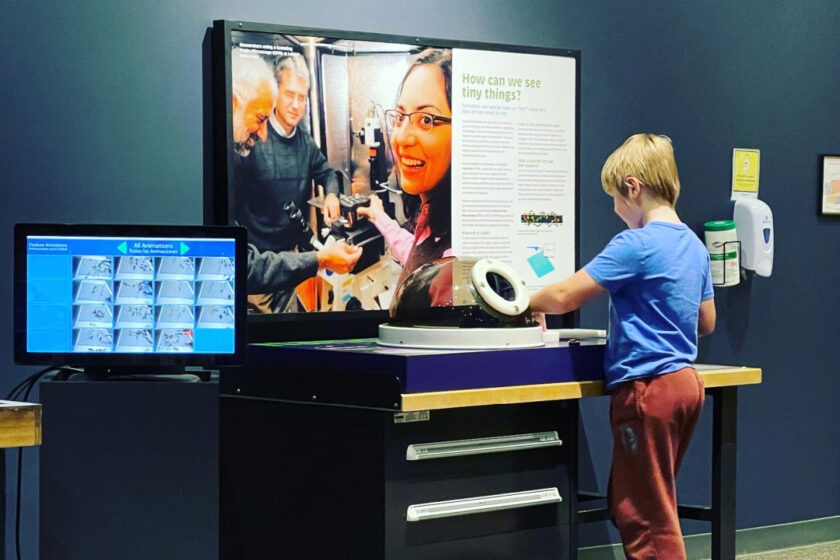
This is fantastic, June! Thank you for writing it. I am a former PTO-flag-waving public school mom, turned unschooler back in the mid 1990s, when MY KIDS asked me to homeschool them. I was flummoxed. “Are you crazy? I can’t do that!” But, they hated public school. They were everything from bored to bullied. So, with them bugging me, I hesitantly began to read, to explore, to attend support group meetings, to ask questions of every homeschooler and unschooler I came across.
Long story short, four months later, I pulled them out just after spring break. Their teachers didn’t say anything while we were on school grounds, but I ran into several of them later on in grocery stores, in parking lots. All of them whispered, “I’m so glad you did this. It was the best choice ever. Schools are imploding. But please, please never tell anyone I said that.” That surprised me.
So, the kids and I started with Abeka, then moved to secular traditional texts like Saxon Math. After six weeks, they said, hey, what happened to unschooling? We don’t want to do school at home. And we began. We stumbled, soared, took wrong turns, backtracked, laughed a lot (and Mom certainly learned a lot of things she’d never learned in her own public schooling!), we flew. Actually the kids flew right past me. One started community college at age 14; the other, at age 16. He went on to earn a Bachelors in Math, with honors. The 14yo got a degree in Cisco Networking. None of this was my doing, you understand. Higher math is not my thing. Either is building or networking computers. These were their choices.
Every year, I asked, do you want to try public school again this year? Maybe you’ll feel differently. The answers were always a resounding NO.
The younger one (the 16yo) refused to do math all the while we unschooled. When he wanted to enter college, he took a placement test. They said, everything he knows is at the 13th grade level (junior in college) — except for math. He has to take remedial math courses. He grumbled, but he did it. Because, if he wanted to take the other college courses, he had to. Then he became so thrilled with math, he’s the one who went on to get the Bachelors! Go figure. Again, nothing to do with me or my teaching skills, or lack thereof.
Now the 16yo is in his 30’s and suddenly regrets unschooling. Peer pressure. He wants to be “normal”, to “fit in.” This breaks my heart. I know he would’ve been miserable in school. I ask him, if your unschooling was so awful, how did you get accepted into college at 16? He won’t discuss it. So, unfortunately, the cons can erupt later in life, too.
To this day, I have a website for unschoolers. I put it up in 1997, because I was tired of answering the same questions on the phone and email over and over and over. I may put a link to your article on there, if that’s all right with you?
Cheers,
Cindy
Thanks for sharing all of that Cindy! I’m so sorry for your pain – that sounds so hard to think you’re in the clear and then have your child regret unschooling. If it helps, I have walked away from much of my parent’s faith and it was harmful to me in a lot of ways, but I don’t resent them for bringing me up that way. They were doing what they thought was best and most loving for me. I hope your kiddo comes to the same conclusion eventually.
My youngest will likely be the one to try school, and I think that if we don’t let her, she would later resent me. Who knows? She might enjoy it. We’ll see!
You can definitely link to this article – I appreciate it, and I hope it helps people weigh the pros and cons for themselves. Take care!
Hi, my wife is considering unschooling vs tradition homeschooling. The one thing I’m not seeing in unschooling is the ability for a kid to learn deadlines. I work as tradesmen in Canada and run my own contracting company, so deadlines/time management is imperative to know and understand.
Also, reality is, kids do need to learn that sacrifice is necessary to succeed and doing something things you don’t like, but to achieve a higher purpose later is also (in my eye) imperative.
I certainly agree that public schools are trash and currently have my kids in a Christian private school. We are considering a Christian oriented (traditional) homeschooling program.
Thank-you for your writing on the subject as I found it informative.
First, I’m so glad you found this helpful! Second, I think this is a really good question with as a parent. Unschoolers do have very flexible schedules and often don’t learn things they don’t want to learn. Many end up becoming entrepreneurs because they want keep that flexibility and only choose to do harder/boring things that relate to their overall passion.
Doing things they don’t want to do is another story. For example, my kids each have one “chore” related to the dishes that they do every day – it was flexible in that they could choose their task and negotiate, but it was not optional for our family. They also do their own laundry at age 9 and brush their teeth, take showers when they don’t necessarily want to, but they know why they need to, so they do it.
But isn’t this what many of us do as adults? We choose a job and take the good with the bad/boring, believing that the good outweighs the bad. If we don’t believe that, we look for new jobs…or choose to endure the job we have (not as ideal).
From an unschooling perspective, kids would learn deadlines as they need to learn them. Many unschooled kids pursue community college or classes of some kind eventually, especially as they get older. They would figure out how to adjust to deadlines at that time.
There is this idea in traditional schooling that kids need to work on something over and over again for twelve consecutive years to learn that thing. In unschooling, I see all the time how this is just not true. Kids can learn something rapidly that would normally be spread out over years – they learn it rapidly because they’re interested OR they need it to do something they are passionate about. Deadlines are no exception.
My husband and I have very different experiences when it comes to deadlines. I am an entrepreneur and set my own deadlines. I have a very flexible job that I created for myself. I can walk away from my websites for a week or two and still earn the same money (or more!). My husband is an engineer, and what he struggles with the most are the never-ending deadlines. It created so much stress that he now works four days a week to manage it.
Perhaps some people are built for jobs with deadlines? And others are built for more flexible work where they have more control over deadlines? Maybe children can grow up to choose one or the other, or something in between that suits their unique temperament and personality? Maybe one of the best things we can do for our children is help them learn their temperament?
As for us, we are going to require our kids to take at least one class before issuing their high school diploma – something with grades and possibly deadlines, depending on the kid (we have a lot of neurodivergence in our family). This is something you could consider doing.
I’ll leave you with one of my favorite quotes about unschooling: “Unschooling is allowing your children as much freedom to explore the world around them in their own ways as you can comfortably bear.” So if there are some levels of freedom that you can’t comfortably bear, that’s ok. You can still embrace a lot of what unschooling has to
Hope this helps!